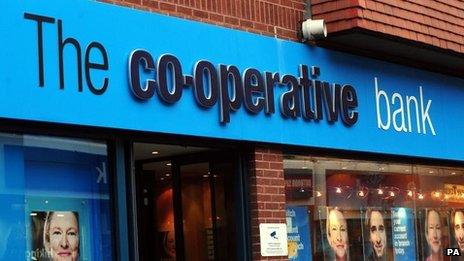Would it be a disaster if Co-op Bank 'fails'?
- Published
- comments

If a voluntary agreement to save Co-op Bank cannot be reached, would resolution - a formal admission that the bank had failed, and its temporary takeover by the Bank of England's Special Resolution Unit - be such a terrible thing?
Well, while this would be painful and embarrassing for the owner, Co-op Group, and some creditors, from a broader perspective it might not be such a disaster.
Here is why.
First the bank would survive as a going concern, and depositors - who have been strikingly loyal through its recent vicissitudes - would not lose any money.
Second, a useful precedent would be created that those who have provided equity and debt capital would bear the full costs of the rescue, without taxpayers having to contribute a penny.
Some would see this as an extraordinarily useful precedent, in that it would be a practical demonstration to professional investors and financial institutions that when they lend to banks they cannot count on being bailed out by the state when it all goes horribly wrong.
It would be a healthy counterweight to the experience of that too-recent crash, when taxpayers were almost bankrupted by the costs of propping up reckless banks.
There would be a sharp and new lesson for all professional investors that when they lend to banks, when they invest in banks' debt capital, they need to properly assess the viability of the banks, and not assume that taxpayers will rescue them if the banks climb aboard the handcart to hell.
It also would mean that investors need to charge the interest rate that properly captures that risk, and not the lower interest rate they've been paid for years, viz the rate based on the implicit promise of bailout by the public sector.
Before I go on, there are two points about this I need to make.
First, there would be short-term economic costs and long-term economic benefits if banks were charged the proper rate when borrowing: in the short term, what they would charge for loans would rise (ouch); in the longer term, with funding more expensive, they would lend more carefully.
Second, the current direction of travel of EU and UK legislation on bail-ins discriminates against smaller banks, in that it would give ministers the power to waive the imposition of losses on creditors where there is a serious risk of contagion to other banks. Which gives a dangerous incentive to banks to become as big and contagious as possible.
So perhaps that is the wrong direction of travel. But that is a story for another day.
Bank powers
Let's return to the Co-op crucible.
Aficionados of the niceties of the vaunted process of "resolving" banks without recourse to taxpayers may pipe up at this point that the Bank of England does not yet have the powers to force losses at its discretion on different classes of credit.
That is a widely held view, but I am assured by a number of well-placed individuals that it is wrong.
What they say is this, that the existing 2009 Banking Act may well be adequate for the task, even though it is not explicit about the Bank of England's powers to oblige debt investors to take a quantified hit.
Which is why something else I have learned is completely fascinating, namely that if the Bank of England's Special Resolution Unit felt moved to take over Co-op Bank, it would leave nothing to chance: an already drafted legal provision giving it explicit bail-in powers would be rushed through parliament as emergency legislation (these are the relevant provisions of the Banking Reform Bill, due to become law, on the current timetable, early next year).
Or to put it another way, the Bank of England is in a position to rescue Co-op Bank, its depositors and core functions as a going concern, while forcing holders of £1.3bn of its bonds and preferred shares to provide the needed additional capital, should that be necessary.
Will it be necessary?
That is unclear. And plainly, most would say, a voluntary deal to rescue Co-op Bank would be preferable.
But right now there are three different sets of interests that are proving hard to reconcile, as the bank tries to find the £1.5bn of additional capital, to absorb losses, which the regulator, the Prudential Regulation Authority, says it needs.
Co-op Group favours a plan in which it puts £1bn into Co-op Bank and keeps a majority stake in the banks, while forcing £500m of losses on providers of £1.3bn of debt capital and preferred stock.
Meanwhile hedge funds controlling 43% of the most valuable of that debt capital, what are called lower Tier 2 capital (don't ask) want a deal in which they emerge with greater ownership of the bank.
And thousands of retail investors want an arrangement where they don't lose everything and keep some kind of bond that would pay them a reasonable annual income.
Talks to reconcile these views are reaching a critical juncture. We should have a rough idea by the end of the month whether a voluntary rescue plan is within sight.
But here is the interesting thing. If a deal cannot be agreed, the Bank of England has the power to force a compromise on them through the resolution process. And that might not be such a disaster.